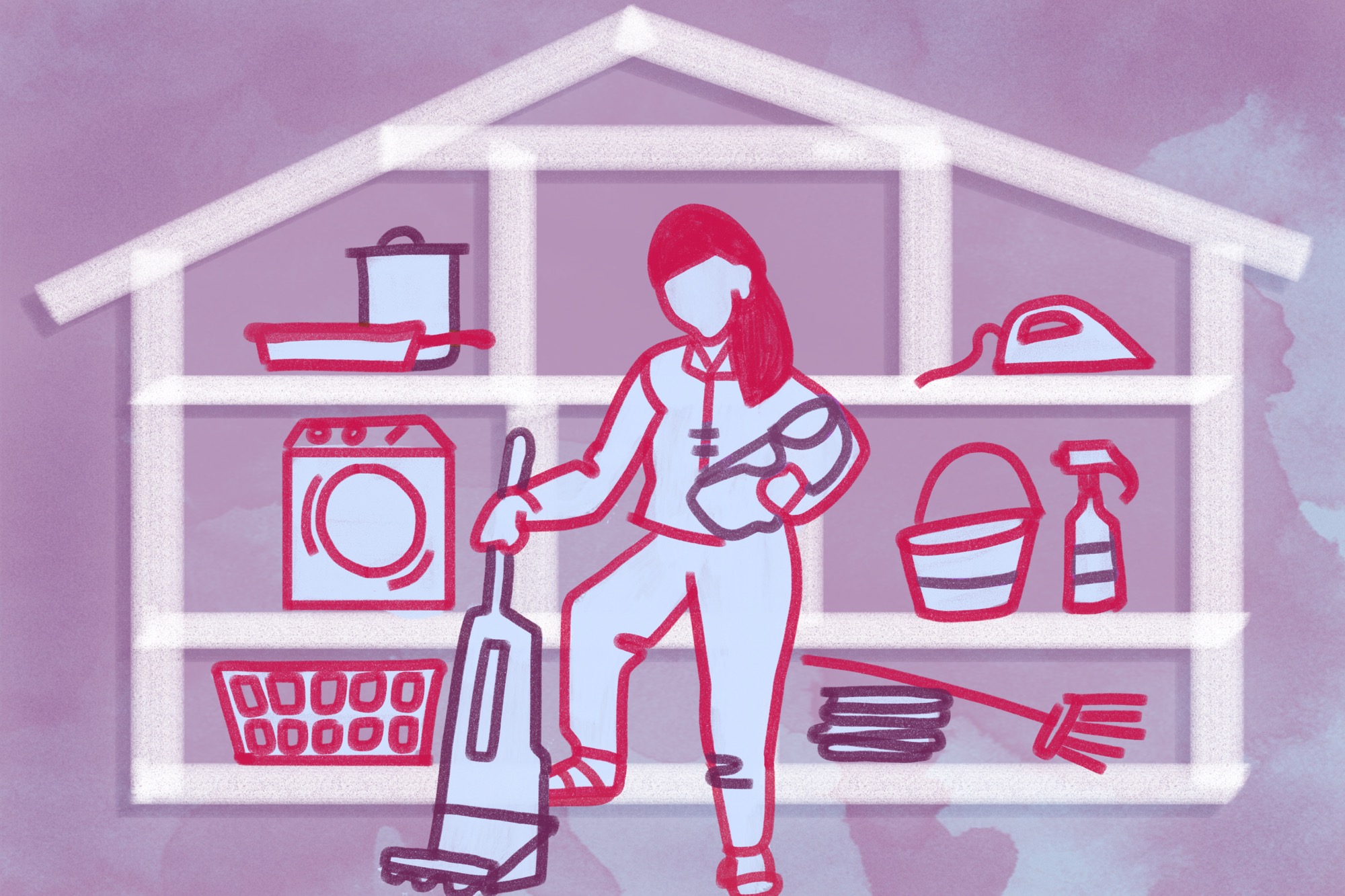Domestic workers in China: Invisible, vulnerable, and indispensable

Despite lacking basic workers’ rights and benefits, domestic workers — ayi — in China’s big cities are nonetheless everywhere, and play a key role in society.
Illustration by Anna Vignet

Every morning, before daybreak, workers living in the outer boroughs of China’s major cities board a series of busses and trains to reach the city centers to provide the overlooked services that keep the city running. These people in the service industry include maids, food delivery drivers, package and mail delivery drivers, construction workers, sanitary workers, and many others, untold millions who are practically invisible yet indispensable.
Mingying He 何明瑛 is one such worker, rising every morning at 4 am from her home in Beijing’s Daxing district inside Beijing’s Fifth Ring Road to catch the earliest bus and a series of metro transfers to eventually arrive at her client’s home in the central Wangjing district. As relayed to Jiemian News’s (界面新闻) online story platform Zhengniu Story 正牛故事, Ms. He spends four to six hours on her daily commute. She works from 7 am until 9 or 10 pm with no breaks. Ms. He is a domestic worker, toiling every day to cook, clean, and care for her many clients.
Domestic workers globally operate in a nexus of vulnerability due to the demographic they belong in, society’s view of the work they do, and the nature of the work itself. An often overlooked sector, worldwide demand for domestic work has rapidly increased in response to increased demand for women in the workforce and the rollback of social programs supporting families.
One factor enabling China’s meteoric rise has been the ready availability of cheap labor. Most reporting on this topic has focused on factory workers, and less attention has been paid to how cheap labor has affected China’s service industry. As China develops, its service industry has quickly eclipsed other sectors. According to the Chinese Ministry of Commerce, in 2018 the total import and export value of the service industry was $4.7 trillion. Because of the low cost of labor, the cost of services like delivering packages or take-out is incredibly cheap. This labor facilitates daily life in major Chinese cities like Beijing and Shanghai.
But there is scarce reporting on the laborers themselves, the human element.
Who are China’s maids?
Who are the workers in the service industry in China?
Migrant workers — those moving from rural to urban areas in search of better employment opportunities — do the majority of the low-wage labor, and in particular make up the majority of the country’s domestic workers. According to Economic Daily, 88.6 percent of domestic workers come from China’s rural areas. A unique aspect of domestic migration in China is the hukou (household registration) system in place, which regulates migration by requiring citizens to seek approval from authorities to move from rural to urban areas and controlling entitlement distribution. A paper published in The Journal of Economic Perspectives by Hongbin Li, Prashant Loyalka, Scott Rozelle, and Binzhen Wu posit that the hukou system’s purpose today is not to necessarily limit migration, but to create a scenario where migrants come to cities without access to entitlements such as in-network health insurance providers, subsidized housing, and well-funded public schools. This function creates a dual-tiered entitlement system, with generous benefits awarded to the small number of urban residents and a much less generous package given to rural citizens. In a 2017 piece published in Health and Human Rights, author Jason Hung finds that migrants are excluded from the protection of various employment laws. In practice, people are allowed to move, but cannot take their citizenship with them.
According to the ILO Country Office for China, migrant women arrive in first-tier cities (Beijing, Shanghai, Shenzhen, and Guangzhou) mostly from rural provinces such as Anhui, Henan, Hunan, Shanxi, and Yunnan. I say women because the ILO finds that more than 80 percent of workers globally and 90 percent of workers in China are women. The age of workers trends older, as younger women are more likely to have higher education levels and are less likely to accept the working conditions. Less than 14.1 percent of domestic workers have completed education past high school. While there is little data about individual workers, some reports have found that salaries range from $500 to $1,000 per month, depending on their job. Categories of workers include hourly workers (钟点工 zhōngdiǎngōng), nannies (保姆 bǎomǔ), mother and child health (母婴护理 mǔyīng hùlǐ), and elder-care (养老看护 yǎnglǎo kānhù). More specialized workers will be paid much higher rates.
According to a 2009 survey done for the ILO’s investigation into the conditions of work and employment for domestic workers, 81.4 percent of domestic workers did not have legal residence in the cities where they worked, excluding them from protection by most labor laws and resulting in less than 10 percent of workers experiencing equal labor protections.
How does this contribute to vulnerability?
Study upon study has shown that domestic workers operate in a nexus of overlapping factors leading to increased risk of exploitation, physical and emotional abuse, and sexual abuse. Female-dominated industries are less likely to be as strictly regulated as male-dominated industries, as work that women do is not seen as “real work.” The characteristics of the women in the field — low-income women with low education levels — also exposes them as targets for abuse. Oftentimes, domestic workers are unaware of their rights, or fear retaliation if they report abuse (a fear that’s justified, as the law in China does a poor job protecting women and tilts toward mediation rather than punishment; also see: domestic violence law).
Another aspect of the increased vulnerability stems from the fact that the work usually happens in private homes, and therefore in its very nature is hard to regulate compared to other occupations. A consequence of this is that the government is reluctant to recognize the household as a worksite and individual families as employers. Without this recognition, families that employ domestic workers are not held to the same standard as other employers and most certainly are not expected to meet certain requirements, such as paying a portion of health insurance, providing a portion of housing fees, and other labor regulations.
What does it all mean? It’s complicated. On one hand, from a gender perspective, working in the maid industry represents a great opportunity for women: The availability of affordable labor allows women to escape the “double day” of both unpaid labor within the home and paid labor in the workplace. It also represents an opportunity for rural women, who have few other employment options and can drastically improve their socioeconomic status by working in cities as maids.
Take, for example, two women from opposite sides of this story. Liu Qing (pseudonym) is a young mother of a two-year-old son, originally from Wuhan but with a Shenzhen hukou, and lives in Shanghai with her husband, who works in law. I interviewed Liu Qing in January 2018 as part of a project on the economy of care work in China. Liu runs her own business teaching art classes to young children, and though her schedule is more flexible than some, she still needs help taking care of her son while both she and her husband are at work. Liu’s situation is reflective of the situation that many Chinese find themselves in, with grandparents unwilling or unable to help them, and parents unwilling or unable to stay at home. In fact, Liu Qing’s parents helped her defray the cost of a yuèsǎo 月嫂, a specialized nanny to help women who recently gave birth and who stay for roughly a month, rather than moving from Wuhan to Shanghai to help her daughter.
On the other side, with the rapid rise in demand for workers, the average salary for domestic workers has risen to rival that of recent college graduates (granted, benefits typically included in salaries are excluded). Women like He Mingying, who have no economic future working in their hometowns have found opportunities through migration to big cities. In He’s hometown of Chifeng, Inner Mongolia, she and her husband’s business selling vegetables was not economically viable. With her children already grown, they decided to seek greater opportunities by moving to Beijing. Although her life is by no means easy, maid work is one of the few routes available to her, and is quite lucrative.
Understanding the pros and cons of the industry, and understanding that little pressure can be exerted on the state to encourage better regulation of the industry, what is there to do? The place to begin is to examine one’s own life: do you hire a maid? How much do you know about her? Do you pay her the same wage that you might pay a worker coming to do a “more technical” job such as fixing a window or a sink? The biggest things you can do is value and respect the women in your employ. See yourself as an employer; your maid or nanny is not a part of your family, but someone who makes her livelihood providing you with labor. Workers in this industry are rendered invisible in the eyes of the state, and their labor is systematically devalued. By treating your worker fairly and recognizing her labor, you are doing your part to undermine the system in place.
Pay them well and above all, treat them with respect.






